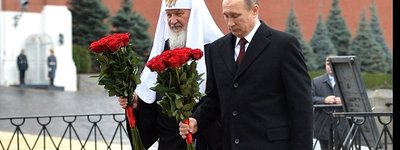MAECENAS OR MAFIOSO?
The recent announcement of a substantial gift by Ukrainian businessman Dmytro Firtash to the Ukrainian Catholic University (UCU) has aroused a lively discussion on the internet in both Ukraine and the diaspora. Some have criticized the University for accepting funds from an oligarch with a reputation for dishonesty, particularly with regard to his company RosUkrEnergo. Although Cambridge University has already accepted a previous gift from Mr. Firtash in support of Ukrainian studies, critics say that UCU, as a Catholic institution, should be held to a higher ethical standard. Their chief arguments are as follows.
First, there is the fundamental objection to accepting "tainted" money. It is widely believed that Mr. Firtash made his fortune in titanium, chemicals, banking and gas through less than honest methods.
Second, there is the fear that a major donor may try to influence the receiving institution, for example by urging a particular course of studies or even a particular philosophy.
A third argument, advanced by Canadian historian Stephen Velychenko, is based on the notion that Mr. Firtash, while not holding public office, should be regarded as a representative of Ukraine's current regime. In an internet discussion among members of the American Association of Ukrainian Studies, Prof. Velychenko characterized the Ukrainian government as corrupt, dictatorial, and Russophile, mentioning that some even regard it as an "occupation regime." The proper response to Mr. Firtash's offer, then, would be to publicly reject it, much as novelist Vasyl' Shkliar recently refused the Shevchenko literary prize. Such a protest would be mandated not only by ethics and self-respect, but by prudence. In an open letter to UCU rector Fr. Borys Gudziak, Prof. Velychenko pointed out that the director of the London School of Economics, having accepted a gift from Col. Muammar Gaddafi over protests from some of his associates, was compelled to resign after the Libyan dictator's crimes were revealed.
Prof. Velychenko has also argued that the oligarch is trying to use his gift to UCU to gain public legitimacy. The University should not participate in such attempts to "launder" one's reputation.
Finally, some argue that by associating itself with a corrupt oligarch the University, which has made honesty and incorruptibility key features of its identity, is causing public scandal. Even if other institutions accept money from questionable sources, a Catholic university should be held to a higher standard.
Each of these five arguments can be countered. The concept of "tainted" money is vague. Can Mr. Firtash's donation be traced to illegal or unethical transactions? Or should the University simply assume that a wealthy businessman's money comes from illicit sources? Throughout the centuries, the Church has accepted gifts from individuals who gained lands and wealth through questionable means. It has sometimes regarded these gifts as a form of penance – provided, of course, that the individual had first repented of his conduct. A Catholic university should be able to do likewise. In fact, it is said that one Jesuit university in the United States has a building named after a local Mafioso – and I do not use that term in the figurative sense.
As for the notion of influence – as far as is known, Mr. Firtash's gift was unconditional. There is no reason to think that he will try to influence the University's scholarly or educational direction. UCU's rector has already demonstrated that he can stand up to the Security Service of Ukraine. Surely UCU can withstand any pressure from donors.
The argument that Mr. Firtash represents a Russophile dictatorship or "occupation" regime is questionable. The Western Ukrainian businessman is no Russophile. In any case, it would be more accurate to call Ukraine's government a post-colonial authoritarian "creole" oligarchy.
By accepting his gift, has UCU conferred respectability upon Mr. Firtash? In whose eyes? Ukrainians are not so naïve. Nor, obviously, is the diaspora. No one is being fooled. And if the public does give him some moral credit for making the gift, is that unfair?
True, the possibility of scandal is not to be discounted. The public sees UCU as an island of morality in an ocean of corruption. The corruption, unfortunately, has made Ukrainians so cynical that they cannot believe that a rich man can do any good.
In fact, cynicism can blind us to three other aspects of the question. What if, for example, Mr. Firtash has truly rued his ways and wants to make amends? We do not and cannot know the intimate details of his decision, or of his conversations with the Rev. Gudziak. Are we in a position to decide a priori that his offer should have been rejected?
Second, gifts like this can serve as restitution to the Ukrainian people. Assuming that an oligarch has stolen from the state – that is, from the people – he can return that wealth by donating it to a university or other institution which, like UCU, is open to all qualified Ukrainians. Should the oligarchs not be encouraged to do so – rather than sink their wealth into offshore accounts, townhouses in London, or palaces in California?
Thus, Mr. Firtash's gift also serves an exemplary function. What if other oligarchs followed suit? Not only would it sustain Ukraine's private universities, schools, hospitals, churches, orphanages, monasteries, or other religious or charitable institutions, but it could encourage unscrupulous oligarchs to come clean and change their ways.
Andrew Sorokowski










